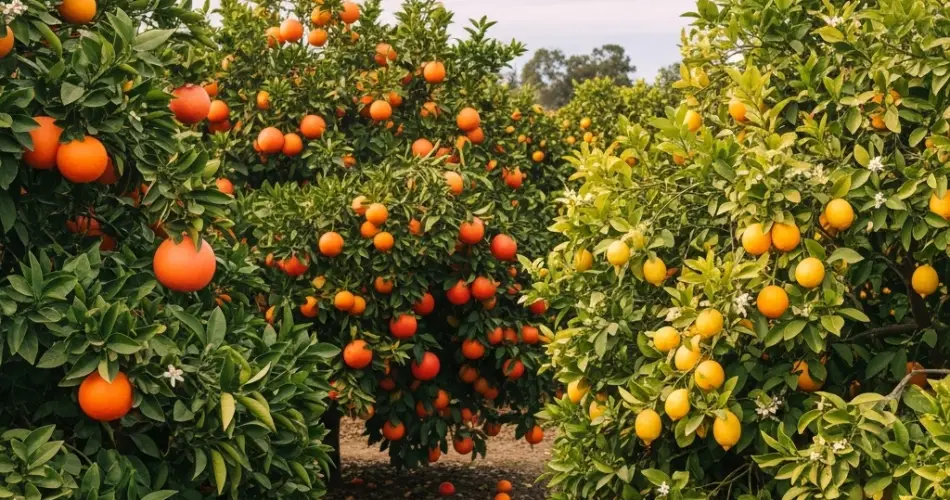Citrus trees, such as lemons, oranges, limes, and mandarins, are popular for their vibrant fruit, fragrant blossoms, and ornamental value. But getting them to grow quickly and bear abundant fruit can be a challenge—especially when soil nutrients are lacking or conditions aren’t ideal. Fortunately, you don’t need synthetic chemicals to boost their growth. With the right organic homemade fertilizer, your citrus trees can thrive naturally.
Here’s how to make an effective DIY fertilizer that promotes faster growth, greener foliage, and better fruiting for all types of citrus trees.
Why Organic Fertilizer Is Better for Citrus Trees
Citrus trees are heavy feeders and require a balance of nitrogen (N), phosphorus (P), and potassium (K), along with micronutrients like magnesium, calcium, iron, and zinc. Organic fertilizers feed the soil, which in turn nourishes the plant, encouraging stronger root systems and more sustainable growth.
Unlike synthetic fertilizers, which can damage soil health over time or burn plant roots if overused, organic options improve soil structure, support beneficial microorganisms, and provide a slow, steady release of nutrients.
Key Nutrients Citrus Trees Need
To produce lush green leaves and juicy fruit, citrus trees benefit from:
-
Nitrogen (N): Stimulates leaf and stem growth
-
Phosphorus (P): Supports root development and flowering
-
Potassium (K): Improves fruit quality and resistance to stress
-
Calcium & Magnesium: Important for overall plant structure and chlorophyll production
-
Iron & Zinc: Essential for photosynthesis and fruit set
A well-balanced organic fertilizer should target all these needs.
How to Make a Natural Homemade Citrus Fertilizer
This simple recipe uses common kitchen and garden waste to create a powerful and eco-friendly fertilizer. Here’s how to prepare it:
Ingredients:
-
Banana peels (2–3 pieces)
-
Crushed eggshells (from 2–3 eggs)
-
Coffee grounds (2 tablespoons)
-
Wood ash (optional – 1 tablespoon for potassium boost)
-
Water (1 liter)
-
Blender or food processor
-
Fine strainer or cloth (if you want to filter the liquid)
Instructions:
-
Prepare the Ingredients:
-
Cut banana peels into small pieces. They are rich in potassium and phosphorus.
-
Crush the eggshells well. They supply calcium and a bit of magnesium.
-
Use used coffee grounds, which contain nitrogen and improve soil texture.
-
Add a spoonful of wood ash if available. It increases potassium and raises pH if your soil is too acidic.
-
-
Blend with Water:
Place all ingredients in a blender with 1 liter of water. Blend until smooth. If your blender is less powerful, soak the peels and shells in water for a few hours beforehand to soften them. -
Strain (Optional):
If you want a liquid fertilizer, strain the mixture through a cloth or fine sieve. The leftover pulp can be buried directly in the soil around the base of the plant. -
Apply to Plants:
Pour the liquid fertilizer around the root zone of your citrus tree. Avoid direct contact with the trunk. Apply every 15–20 days during the growing and fruiting season (spring through early fall).
Additional Organic Boosters for Citrus Growth
For even better results, consider these natural methods alongside your homemade fertilizer:
-
Mulching: Use dried leaves, straw, or grass clippings to retain moisture and suppress weeds around your citrus tree. This also slowly feeds the soil as the mulch breaks down.
-
Compost Tea: Brew compost in water for a few days and use the liquid to water your tree. It introduces beneficial microbes and nutrients.
-
Epsom Salt: Once a month, dissolve 1 tablespoon of Epsom salt (magnesium sulfate) in a liter of water and apply to the soil. This boosts magnesium and improves leaf color.
-
Pruning and Sunlight: Make sure your citrus tree receives 6–8 hours of sunlight daily and remove dead or crowded branches to allow air circulation and better light penetration.
Common Citrus Growing Mistakes to Avoid
Even with great fertilizer, citrus trees may struggle if basic care is overlooked. Watch out for these common issues:
-
Overwatering: Citrus roots dislike soggy soil. Water deeply but allow the soil to dry slightly between waterings.
-
Poor Drainage: Always plant in well-draining soil or raised beds to prevent root rot.
-
Incorrect pH: Citrus prefers slightly acidic soil (pH 5.5 to 6.5). Test your soil and adjust with lime or sulfur if needed.
-
Underfeeding: Regular feeding is essential, especially during the growing season. Organic fertilizers work best when used consistently.
Final Thoughts
With the right care and natural nutrition, citrus trees can grow faster, look healthier, and reward you with a generous harvest of flavorful fruit. Homemade organic fertilizer is a cost-effective, sustainable way to feed your plants without harming the environment. By using ingredients you likely already have in your kitchen, you can nourish your citrus trees the natural way and enjoy the sweet results year after year.



